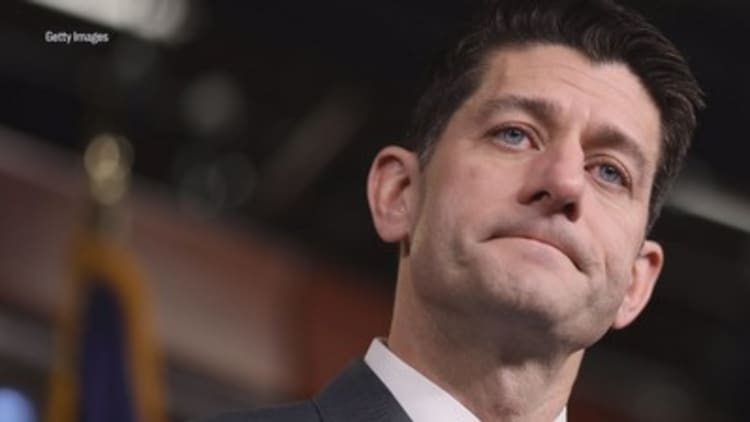
House Speaker Paul Ryan will not run for re-election this fall, throwing another wrench into Republican efforts to hold a House majority in November.
The GOP faces a tough fight to keep the House in this year's midterms amid Democratic enthusiasm and opposition to some policies pushed by President Donald Trump and the Republican-controlled Congress. The speaker's move raises the prospect that more GOP lawmakers could decide not to run for re-election.
At a Wednesday morning news conference, Ryan said he retired so he could see more of his teenage children. He also said the prospect of Democrats winning the House had no effect "whatsoever" on his move to retire.
"Today, I am announcing that this year is my last one as a member of the House. ... I will be retiring in January, leaving this majority in good hands with what I believe is a very bright future," he said.
In a statement announcing Ryan's decision earlier, advisor Brendan Buck said Ryan told colleagues Wednesday that he will serve out his full term and leave office in January. The congressman "is ready to devote more of his time to being a husband and a father," Buck said.
Ryan achieved his long-held goal of overhauling the U.S. tax code in December. Once he did so, he felt comfortable leaving a job that had become taxing due to Trump's behavior, according to the Axios report.
The speaker told fellow Republican lawmakers and staff during a closed-door meeting that he was retiring to spend more time with his family, a GOP source, who was inside the room during the conference, told CNBC on condition of anonymity.
"He indicated that he has a house full of teenagers who have only known him in Congress, and they're ready for him to come home and be a father," the source said.
House Majority Leader Kevin McCarthy, R-Calif., and House Majority Whip Steve Scalise, R-La., are among the leaders who could try to succeed Ryan as the top Republican in the chamber. Both have quietly started to make moves for the job, according to Politico. The GOP source told CNBC that McCarthy and Scalise have the inside track, but other lawmakers are looking into making a run, too.
Scalise will not run for the post if McCarthy does, according to Axios.
Neither McCarthy nor Scalise gave any hints Wednesday about whether they would seek to lead House Republicans.
In a tweet Wednesday, Trump called Ryan a "truly good man" and said "he will leave a legacy of achievement that nobody can question."
Ryan, who has served in the House since 1999, likely would have won a re-election bid. But he would have faced a better-funded opponent than he is used to in Democrat Randy Bryce, whom the House Democrats' campaign arm is supporting for the nomination.
In a statement, National Republican Congressional Committee Chairman Rep. Steve Stivers, R-Ohio, said, "Our mission to hold the House continues unabated" despite Ryan's retirement.
In a statement, Democratic Congressional Campaign Committee spokesman Tyler Law contended Ryan "sees what is coming in November" and decided to leave Congress rather than defend the Republican agenda. He argued more GOP retirements could be imminent.
It is unclear whom the GOP will want to run for the Wisconsin's 1st District seat. One candidate, Paul Nehlen, has previously challenged Ryan but is unlikely to gain traction with the party because he has espoused white supremacist views.



